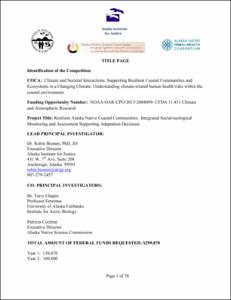Resilient Alaska Native Coastal Communities: Integrated Social-ecological Monitoring and Assessment Supporting Adaptation Decisions. Project narrative.

View/
Average rating
votes
Date
2015Author
Bronen, Robin
Chapin, Terry
Cochran, Patricia
Status
PublishedPages
42pp.
Metadata
Show full item recordAbstract
Introduction to the Problem: A rapidly changing climate in the Arctic is dramatically
impacting the health and well-being of Alaska Native communities. Erosion and repeated
extreme weather events damage infrastructure, including health clinics and water and sewage
treatment facilities. Saline intrusion and thawing permafrost impact access to potable water. In
the most extreme cases, accelerating rates of erosion are life-threatening and are causing Alaska
Native communities to choose to relocate their entire community.
Rationale: This research strives to increase the adaptive capacity of Alaska Native communities
experiencing the impacts of climate-induced environmental change on their health and wellbeing.
Community engagement and empowerment are critical to any process aiming to improve
the adaptive capacity of Alaska Native communities. By developing new and building upon
existing trust relationships, learning from, and co-producing knowledge with communities, we
seek to .....
Publisher
Alaska Institute for JusticeAnchorage, AK
Document Language
enEssential Ocean Variables (EOV)
N/ASpatial Coverage
Arctic RegionAlaska
Citation
Bronen, R., Chapin, T. and Cochran, P. (2015) Resilient Alaska Native Coastal Communities: Integrated Social-ecological Monitoring and Assessment Supporting Adaptation Decisions. Project narrative. Anchorage, AK, Arctic Institute of Justice, 42pp. DOI: http://dx.doi.org/10.25607/OBP-1696Collections
- CAPARDUS Practices [244]
 Repository of community practices in Ocean Research, Applications and Data/Information Management
Repository of community practices in Ocean Research, Applications and Data/Information Management